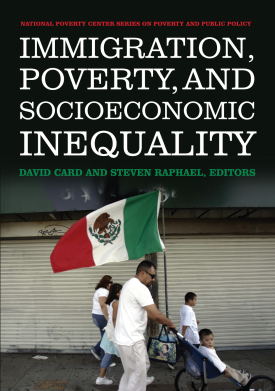
Immigration, Poverty, and Socioeconomic Inequality
About This Book
The rapid rise in the proportion of foreign-born residents in the United States since the mid-1960s is one of the most important demographic events of the past fifty years. The increase in immigration, especially among the less-skilled and less-educated, has prompted fears that the newcomers may have depressed the wages and employment of the native-born, burdened state and local budgets, and slowed the U.S. economy as a whole. Would the poverty rate be lower in the absence of immigration? How does the undocumented status of an increasing segment of the foreign-born population impact wages in the United States? In Immigration, Poverty and Socioeconomic Inequality, noted labor economists David Card and Steven Raphael and an interdisciplinary team of scholars provide a comprehensive assessment of the costs and benefits of the latest era of immigration to the United States.
Immigration, Poverty, and Socioeconomic Inequality rigorously explores shifts in population trends, labor market competition, and socioeconomic segregation to investigate how the recent rise in immigration affects economic disadvantage in the U.S. Giovanni Peri analyzes the changing skill composition of immigrants to the United States over the past two decades to assess their impact on the labor market outcomes of native-born workers. Despite concerns over labor market competition, he shows that the overall effect has been benign for most native groups. Moreover, immigration appears to have had negligible impacts on native poverty rates. Ethan Lewis examines whether differences in English proficiency explain this lack of competition between immigrant and native-born workers. He finds that parallel Spanish-speaking labor markets emerge in areas where Spanish speakers are sufficiently numerous, thereby limiting the impact of immigration on the wages of native-born residents. While the increase in the number of immigrants may not necessarily hurt the job prospects of native-born workers, low-skilled migration appears to suppress the wages of immigrants themselves. Michael Stoll shows that linguistic isolation and residential crowding in specific metropolitan areas has contributed to high poverty rates among immigrants. Have these economic disadvantages among low-skilled immigrants increased their dependence on the U.S. social safety net? Marianne Bitler and Hilary Hoynes analyze the consequences of welfare reform, which limited eligibility for major cash assistance programs. Their analysis documents sizable declines in program participation for foreign-born families since the 1990s and suggests that the safety net has become less effective in lowering child poverty among immigrant households.
As the debate over immigration reform reemerges on the national agenda, Immigration, Poverty, and Socioeconomic Inequality provides a timely and authoritative review of the immigrant experience in the United States. With its wealth of data and intriguing hypotheses, the volume is an essential addition to the field of immigration studies.
DAVID CARD is Class of 1950 Professor of Economics at the University of California, Berkeley.
STEVEN RAPHAEL is professor of public policy at the Goldman School of Public Policy at the University of California, Berkeley.
CONTRIBUTORS: Marianne P. Bitler, Irene Bloemraad, Sarah Bohn, Chistian Dustmann, Mark Ellis, Cybelle Fox, Tomasso Frattini, Robert G. Gonzales, Hilary W. Hoynes, Christel Kelser, Jennifer Lee, Ethan Lewis, Magnus Lofstrom, Renee Reichl Luthra, Douglas S. Massey, Giovanni Peri, Michael A. Stoll, Matthew Townley, Roger Waldinger, Richard Wright, Min Zhou.
A Volume in the National Poverty Center Series on Poverty and Public Policy
